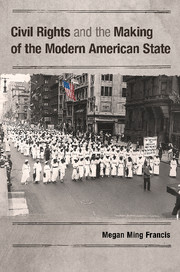Book contents
- Frontmatter
- Dedication
- Contents
- List of Figures and Table
- Illustrations
- Acknowledgments
- Abbreviations
- 1 Rethinking Civil Rights and American Political Development
- 2 The Birth of the NAACP, Mob Violence, and the Challenge of Public Opinion
- 3 The Unsteady March into the Oval Office
- 4 Anti-Lynching Legislation and the Sinking of the Republican Ship in Congress
- 5 Defending the Right to Live
- 6 Civil Rights Bound
- Appendix Manuscript Sources
- Bibliography
- Index
- References
4 - Anti-Lynching Legislation and the Sinking of the Republican Ship in Congress
Published online by Cambridge University Press: 05 June 2014
- Frontmatter
- Dedication
- Contents
- List of Figures and Table
- Illustrations
- Acknowledgments
- Abbreviations
- 1 Rethinking Civil Rights and American Political Development
- 2 The Birth of the NAACP, Mob Violence, and the Challenge of Public Opinion
- 3 The Unsteady March into the Oval Office
- 4 Anti-Lynching Legislation and the Sinking of the Republican Ship in Congress
- 5 Defending the Right to Live
- 6 Civil Rights Bound
- Appendix Manuscript Sources
- Bibliography
- Index
- References
Summary
The passage of the Dyer Anti-Lynching Bill in the House of Representatives this afternoon by a vote of 230 to 119 is one of the most significant steps ever taken in the history of America. For the Negro it means that continual agitation has at least been answered and the appeal of the colored man to Congress for relief from mob violence has at last been granted. The reign of terrorism and anarchy must end is the message to lynchers that Congress has sent.
– James Weldon JohnsonThe manner of the defeat of the Dyer Anti-Lynching Bill emphasizes the fact that the machinery of the United States Senate is antiquated to the point that millions of people may suffer injustice and death on account of it.
– W. E. B. Du BoisOn January 26, 1922, the House of Representatives gave African Americans a reason to celebrate in national politics. On this day, hundreds of excited African Americans filled the House of Representatives gallery to watch the floor debate of H.R. 13, a bill mandating the federal government take an active role in preventing lynchings. This was the first piece of legislation African Americans felt they had a hand in crafting, and they were not going to miss out. They watched in rapt attention and cheered as white Republicans articulated the threat lynching posed to African Americans and how it violated their constitutional rights. They booed loudly as white southern Democrats attributed lynchings to rape and argued that lynchings were a matter of states’ rights and the federal government should not be involved. When the vote was counted, supporters of African Americans won, and the House of Representatives passed its first-ever anti-lynching bill by a two-thirds vote. It was a rare moment in early twentieth century America that demonstrated to African Americans they too, could get their voices heard in the national political process.
- Type
- Chapter
- Information
- Civil Rights and the Making of the Modern American State , pp. 98 - 126Publisher: Cambridge University PressPrint publication year: 2014

